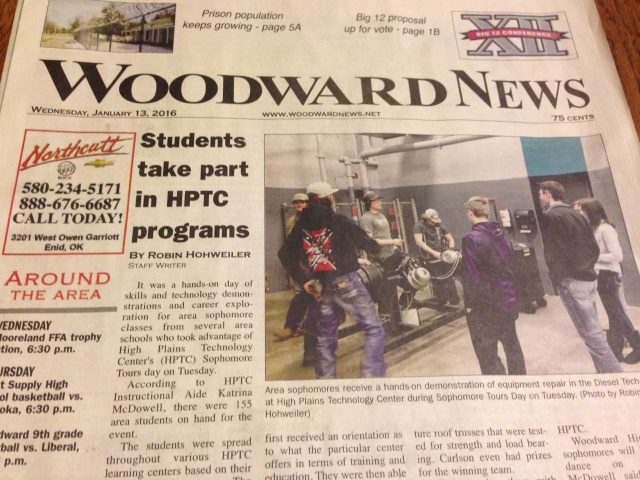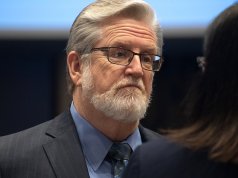
If Rep. Ben Sherrer (D-Chouteau) somehow succeeds in his proposal requiring all Oklahoma voters to hold a subscription for a newspaper, just what will he accomplish?
Rep. Sherrer has likely not noticed my ongoing series that analyzes local newspapers from around Oklahoma. Sayre, Watonga and Durant have already drawn my critical attention, and, if I’m honest, my discussions of their content have been diplomatic.
Out of decorum, I have withheld sharp criticism of stereotypically shrinking newsrooms that are usually trying to top their ad stacks with a combination of fluffy community cheerleading and, at best, Associated Press capitol reporting.
But that was before I saw Rep. Sherrer’s “newspaper bill,” arrogantly titled the Paper-Informed Public Act. It states:
“… each citizen of the State of Oklahoma of voting age shall be required to subscribe to a newspaper of general circulation in the citizen’s county of residence. For the purposes of this subsection, a ‘newspaper of general circulation’ shall mean a publication authorized for legal publication under Title 12 of the Oklahoma Statutes.”
It would also require the state’s Top Bureaucracy (O-MESS) to create a form by which any voter could claim he or she is destitute and unable to afford a subscription to his or her county’s top paper.
I’ll leave it for The Lost Ogle to label the bill with its favorite adjective, “crazy,” and make up fake reactions to its proposal. (Seriously.)
Instead, I’ll hypothesize what would happen if somehow this bill passed into law and was not deemed an unconstitutional poll tax, which it conceivably is, forms attesting poverty aside.
What would a public more “informed” by their county papers of record potentially look like?
Woodward News
Sunday, I drove to northwest Oklahoma for something unrelated to NonDoc. On my way, I obtained both a Wednesday and a Saturday copy of the Woodward News.
In a county that doesn’t allow bars to sell liquor on Sundays, perhaps I shouldn’t have been shocked to see a blurry confederate flag image on the Wednesday edition’s front page, but I was. (Photo above.)
The story was about a “hands-on” career day for students at the High Plains Technology Center, and I called News reporter/photographer Robin Hohweiler to see if the rebel flag’s appearance — albeit on an article of clothing worn by a student — drew any reader complaints.
“Not that I’m aware of,” he said. “I was in that particular room for all of about 10 seconds to get the photo. I didn’t even notice the flag until after I was back here and I kind of downloaded the photo.
“I’m not even sure I really even noticed it when I downloaded the photo and pushed it forward,” he said.
Woodward County’s population is about 86.7 percent white and 1.6 percent black, according to census data. Estimates say between 21,000 and 22,000 people live in the county.
Therein lies an interesting element of how the confederate flag is still viewed in different parts of America. While 72 percent of African-Americans consider the flag to be a symbol of racism, only 17 percent see it as a symbol of “southern pride,” according to a June 2015 CNN poll. On the other hand, 66 percent of whites view the flag as southern pride while 25 percent see it to be racist.
But if only between 300 and 400 people in Woodward County are African-American, it stands to reason that these disparate views of the confederate flag are rarely discussed, even (apparently) in a newsroom or by the paper’s readers. That’s unlikely to change if the state hilariously mandates subscriptions.
The rest of Wednesday’s Woodward paper was filled largely with AP copy and substantial advertising, good news for the CNHI publication, which Hohweiler said was doing well.
On the front, a wire story about the Oklahoma Supreme Court’s decision to allow the proposed education sales-tax initiative petition to proceed sat next to stories on school-construction projects and non-profit groups. Inside, the paper’s opinion page featured two syndicated columns.
The most substantial story in Wednesday’s edition was this piece on prison-population growth by Oklahoma Watch’s Cliff Adcock. Oklahoma Watch makes agreements with publications across Oklahoma that allows their reporting to appear in print, but mandating that the public subscribe to papers would not require the papers to run Oklahoma Watch’s in-depth coverage.
Saturday’s edition, meanwhile, featured above-the-fold art of smiling homecoming faces from the town of Mooreland and a Bobcat doing “dirt work” for Woodward High School parking lots. CNHI state writer Janelle Stecklein’s coverage of an earthquake hearing at the State Capitol offered some in-depth reporting.
Inside, a column on Oklahoma’s revenue failure by Rep. Mike Sanders (R-Kingfisher) led the opinion page. It was paired with excerpts from Tulsa World and The Oklahoman editorials.
So two days worth of product from the Woodward News had offered some decent civic coverage, mostly from the AP, CNHI’s Capitol Bureau and Oklahoma Watch. But would state-required subscriptions equate to a more-informed Woodward County populace?
That’s a question legislators might ponder if Rep. Sherrer’s bill gets a hearing, and it will be interesting to see whether the Pryor Daily Times covers his proposal. In October, the paper (which covers the area of his district) ran a Letter to the Editor from the representative mysteriously titled, “Sherrer supports newspapers during.”
During what? The answer remains elusive.
Perhaps if Sherrer’s newspaper-subscription bill passes the House, occasional NonDoc contributor Sen. Kyle Loveless (R-OKC) can offer an amendment to require editors to read headlines backward and forward.
At the least, maybe they could screen photos on the front page for images some might consider racist.






















